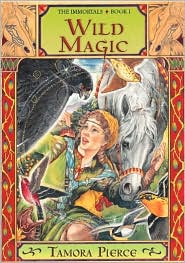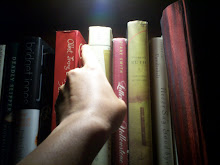 No matter what people say about judging books by their covers and all of that, I will be the first to admit that books with attractive covers are the first to catch my eye and, more often than not, the ones I end up buying. I like bright colors and creative color schemes and evocative imagery; those are the principle characteristics of the covers of best-sellers like The Time Traveler's Wife (Audrey Niffenegger), The Alchemist (Paulo Coelho), and--yes, I'll admit it--Stephenie Meyer's Twilight that I have noticed, purchased, and enjoyed. As a result, it's actually become general (though mostly un-acknowledged) policy for me to literally judge books by their covers. True, it's a pretty prejudiced habit, but it's one that's actually proven trusty over the years so I generally follow it.
No matter what people say about judging books by their covers and all of that, I will be the first to admit that books with attractive covers are the first to catch my eye and, more often than not, the ones I end up buying. I like bright colors and creative color schemes and evocative imagery; those are the principle characteristics of the covers of best-sellers like The Time Traveler's Wife (Audrey Niffenegger), The Alchemist (Paulo Coelho), and--yes, I'll admit it--Stephenie Meyer's Twilight that I have noticed, purchased, and enjoyed. As a result, it's actually become general (though mostly un-acknowledged) policy for me to literally judge books by their covers. True, it's a pretty prejudiced habit, but it's one that's actually proven trusty over the years so I generally follow it.
So when my librarian-friend, Sarah, stuck a copy of The Nonesuch in my hands, I was a bit apprehensive. "Funny-looking regency dude in front of shrubbery" isn't exactly my idea of awesome cover material. Still, Sarah has dependable literary taste, and she seemed so enthusiastic that I just had to read it.
This ended up being one of those reading experiences that make me perhaps maybe sort of consider changing my position on books with fugly covers. "Perhaps," I begin to think to myself, "maybe I should stop going only for the pretty books, because if I'd stuck hard and fast to the rule, I would have never read this piece!"
The Nonesuch is one of those books that you (or, well, I) enjoy not because of any depth or profundity of subject matter, but because it has fabulous wit and style. And because it was written by Georgette Heyer (an extremely prolific writer from the 1900s who is known both for her creation of the Regency England Romance genre and for her extremely well-researched books). If you've run out of Jane Austen books and are feeling the pinch of Regency Withdrawal Syndrome, nothing could possibly serve as a better fix than Heyer's 50+ novels (except, perhaps, Austenland by Shannon Hale for it is in fact a CURE for Regency Addiction). I digress. Basically, the woman was a total beast (and I mean that, of course, in a good way).
Back to the novel, plot first. The Nonesuch takes place in the Yorkshire countryside during (as you might have guessed) the British Regency Era. The plotline receives it's first push from a dead relative's bequeathment of his country property, Broom Hall, upon the already well-landed Sir Waldo Hawkridge, who is in fact the Nonesuch himself (for there is none such as him! Oh-ho! Clever!). Sir Waldo is "of the Corinthian set", a "top o' the trees" sort of gent, and a bona-fide "pink of the Ton"--basically a bunch of crazy Regency terms used to describe his good breeding and general social admirability.
At any rate, Sir Waldo and his cousin Lord Julian Lindeth set off to the countryside to investigate this property that Waldo has been given. The news of Waldo's intended visit to Yorkshire precedes him and causes a considerable stir among the locals, and his arrival at Broom Hall kicks off a flurry of social activity in the area--a series of balls and dinners and parties all put together for the purpose of impressing and perhaps ensnaring the ever-sought-after Nonesuch.
Aside from Lindeth and Waldo, the other principle characters are two lovely ladies: Miss Theophania (Tiffany) Weild, heiress, and her governess-companion, Miss Ancilla Trent [Ancilla is such a cool name]. In short, Tiffany is the underaged heir to a considerable fortune who lives with her paternal Aunt Underhill at Staples Manor. She is also very beautiful, headstrong, hideously selfish, and manipulative, and the only one who can keep her under a semblance of control is the cool, collected Miss Trent.
Over the course of Sir Waldo's tenure at Broom Hall, he and his cousin meet Tiffany and Ancilla on many occasions, and due to Lindeth's infatuation with the lovely Tiffany, Waldo and Ancilla end up spending a great deal of time together. This and that happen and, as one can guess, love can indeed bloom as late in life as at the absolutely decrepit age of twenty-six (ha ha ha).
The Nonesuch was fabulously entertaining. Because of her wealth of knowledge on the Regency Era, Georgette Heyer's writing rings very true in terms of grammar, style, and vocabulary. Her use of ye olde school cant/language doesn't feel forced or fake like it tends to in a lot of other novels of the same type. And, above and beyond that, she just really knows how to use said language to create bitingly sarcastic characters (and, oh, but don't I love tongue-in-cheek humor!). Such fun!
I wouldn't call Georgette Heyer's works "classics"--they're not about to be taught in an English class or anything--but in terms of style and authenticity I'd say they're on par with a lot of the well-known Era stuff. And they're fun, to boot!
Positively anyone can read The Nonesuch, and if you are at all into BritLit and romance and witty banter, you most definitely should!












 prison. Like in the movie, the questions on the game show serve as the mechanisms for the flashbacks that tell RMT's life story. Through each chronologically displaced episode we get one more piece to the puzzle and learn, in time, what has driven RMT to be on the game show in the first place.
prison. Like in the movie, the questions on the game show serve as the mechanisms for the flashbacks that tell RMT's life story. Through each chronologically displaced episode we get one more piece to the puzzle and learn, in time, what has driven RMT to be on the game show in the first place. 


